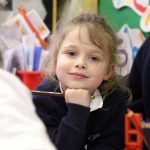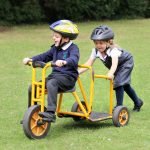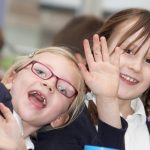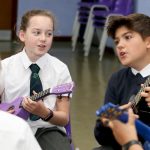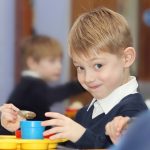Class Five Newsletter – Autumn Term
Autumn Newsletter, Year 5
Welcome to Year 5! We hope you have enjoyed your holidays and, like us, are looking forward to a busy term ahead. We outline below the curriculum areas to be covered this term as well as ways you can help us to support your child’s learning in Year 5.
English
As the children grow in independence and maturity in their reading and their writing, we will be supporting them to develop their own voices, discussing and highlighting the options available to them, both stylistically and in their choices of vocabulary. We will be encouraging peer and self assessment to develop the children’s awareness of detail, particularly in spelling and punctuation, and will be discussing the texts we read in class, expressing our own ideas and responses and justifying these with evidence found within the texts. We will begin the term with the study of a visual text, The Alchemist’s Letter, and will follow this by reading and writing our own Greek myths in support of our history topic this term. We will be reading fiction from other cultures and will link this to writing instructions and explanations. We will also be developing our debating skills, prompted by poetry read in class. We will continue to study spelling patterns and will be asking the children to practise these at home, identifying further examples and noting their use within texts.
Maths
We will start this term by looking at place value in whole numbers and then in decimal numbers. We will also cover written and mental addition and subtraction methods, including using column addition to add pairs of 5 digit numbers. The children will practise their times tables daily and during this term they will use mental multiplication and division. They will find common multiples, factors of 2 digit numbers and they will compare fractions. We will continue to look at 3D shape, asking the children to visualise 3D shapes from 2D drawings. The children will also describe the properties of prisms and pyramids and classify quadrilaterals. When looking at measures, the children will convert between grams and kilograms and millilitres and litres, to one decimal place. We will regularly set the children problem solving investigations to develop their problem solving and reasoning skills.
History and Geography
We begin the year with a history focus, studying the ancient Greeks, their beliefs and culture and their lasting significance today. We will be taking the children to London to visit the British Museum, looking in particular at the Elgin Marbles and studying artistic styles as represented in ancient Greek pottery and sculpture.
Science
For the first half term we will learn about the properties of materials. The children will compare and group together everyday materials on the basis of their properties, including their hardness, transparency, and conductivity (electrical and thermal). They will give reasons, based on evidence from comparative and fair tests, for the particular uses of everyday materials. In the second half term, we will be learning about forces; discussing what gravity and resistance are and identifying the effects of friction and water resistance. The children will have lots of opportunities to work scientifically, planning different types of scientific enquiries to answer questions. They will take measurements, use a range of scientific equipment, record results and report and present their findings.
Computing
The children will continue to learn about ESafety, looking at privacy and being a good ‘online citizen.’ We will learn about data collection; creating data collection forms and entering data from these accurately. The children will use spreadsheets and make graphs from the calculations on their spreadsheets.
Art and DT
As we are in ‘Badger Class’ this year, we will begin the year with a study of monochrome art. We will produce our own monochrome sketches and will experiment with using digital technology to manipulate images and apply a range of colour palettes to our work. We will also be introducing the idea of using perspective and viewpoint to add interest to our images.
In DT, we will be producing Greek flat breads in our lovely new food tech room and we will study Greek architecture to produce our own Greek temples, choosing our materials and construction techniques to ensure that our finished designs are stable and robust as well as including key design features of the time.
RE and PSHE
In RE, we will be reading stories from the New Testament as well as considering the significance of Christmas for Christians. We will also be learning about Hinduism and the festival of Diwali.
Our PSHE learning will lead us to think about citizenship and values, discussing how we can make a positive contribution and considering our feelings and relationships with others.
Music
We are fortunate to continue to benefit from ‘Wider Opportunities’ tuition of music in Year 5. This term we will be learning about samba, identifying rhythms and learning to play simple, rhythmic phrases in combination.
PE
For the first half term, PE will be taught on a Wednesday and Friday afternoon. In the second half term, PE will be on a Wednesday and Thursday. The children will be partaking in cross country, football and tag rugby.
French
Our key themes this term will be learning to give the date, ordering foods in a café and knowing the names of items of clothing, working towards a class fashion show. We will focus on developing the children’s ability to understand increasingly complex sentences and to build sentences of their own, adding adjectives and remembering the importance of ensuring that adjectives reflect gender and number in French. Any additional practise that you are able to offer at home is extremely beneficial for building confidence and embedding vocabulary in any new foreign language so please do give this a try if you feel able.
Homework
The children will be asked to complete 3 pieces of homework each week; these will include spellings and one piece each of English and maths homework, each taking approximately 40 minutes to complete. Homework should build upon work in class and it should be clear to your child what is required of them. Please limit your support to ensuring that they have the opportunity to complete their work in a timely fashion and that they present their work neatly and to the best of their ability. If they have any questions, we are always happy to answer them; the aim of our homework is to re-enforce the children’s classroom learning and to see that they are applying their learning independently, in line with national expectations.
Reading continues to be important for your child’s development; please encourage your child to sample a wide range of text types and support their interest in reading by discussing what they have read and by continuing to share texts together when possible. They should read daily at home where possible, completing reading challenges regularly as they wish.
If you have any concerns or issues you would like to discuss regarding your child, please don’t hesitate to ask us any questions either at the door at the end of the day or via the office if you would like to arrange a more formal meeting.
Mrs Rudkin and Miss Sabin














